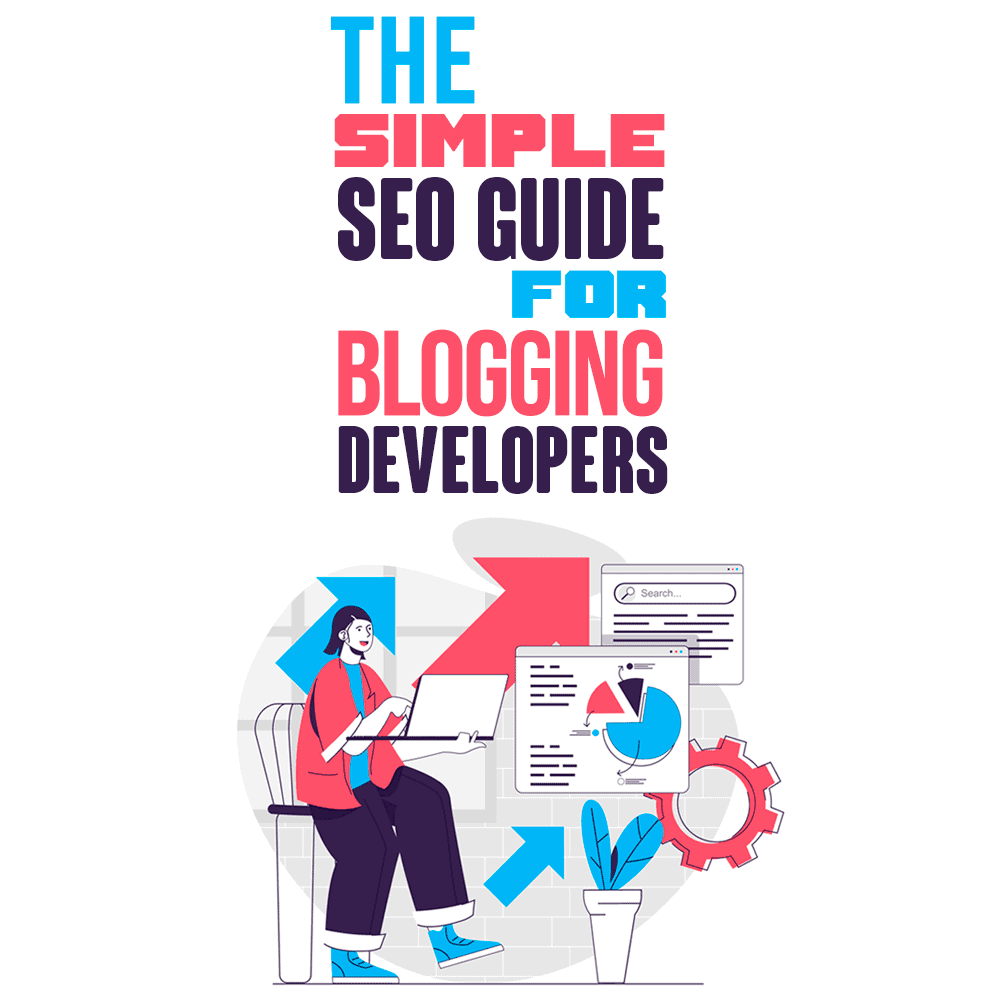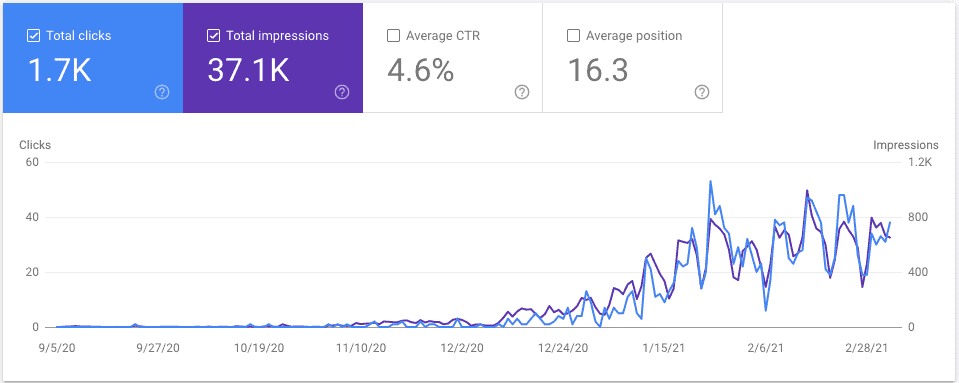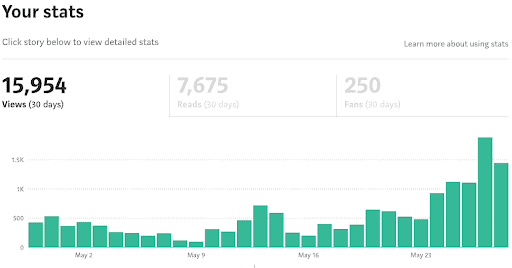
And then there’s all the jabber about how hard it is to even start a blog. All the competition. The yeeeeaaaars it can take to get your content to rank on Google’s first page. The toil of building backlinks. And the grind of posting once a day or week or month.
And all this only to discover that SEO is losing the steam, thrust, and power it once had?
I find this kind of SEO jabber as exciting as a Tupperware party and as useful as decaffeinated coffee. It might be true for other industries, but we’re software developers. And where do most developers run when they need to find some help?
GOOGLE! 😋
“Just Google it” – ya know?
Sure, there are other places that some developers run to—YouTube for example. But lots of us prefer reading to watching. We’re used to reading code, so why not read blog articles that explain how to solve coding problems? And that’s why we scurry to Google.
We’ll let others talk about rearranging their chairs on the “sinking Titanic of SEO.” They can cry their woes while you and I build our blogs and watch our rankings soar.
So, here’s the story. And here’s how I did it.
Less than a year ago I started my own blog about Angular. And discovered that SEO is NOT dead.
You can get a surprising amount of organic traffic fast if you’re willing to put in the work. And once you’ve got a place on the internet that people are attracted to, there are gazillions of ways to make some passive income with that attention.
So how can you do it? What are the ways to make sure that your blog starts ranking? And how can you get organic traffic even if you’re only getting started?
I don’t believe in using spammy, scummy, shady SEO to boost your blog’s SEO performance—they’ll only turn around to bite you later. You’ve got to be willing to put in some consistent, hard work. Here are my five best SEO tips that will help your blog start ranking faster.
Add Your Website to Google Search Console
“Google Search Console is a web service by Google which allows webmasters to check indexing status and optimize visibility of their websites.” — Source
This is the most important SEO tip that could be given. And best of all, it’s not hard to do.
If your website isn’t registered with the Google Search Console, then you won’t really be able to know if your developer blog is ranking and more importantly how well it is ranking. Plus, Google can’t start ranking a website that it doesn’t know about, so if there are no backlinks to your content, then Google won’t find your website.
Plus, you have no excuse when it only takes 15 minutes to do this.
To start the process, you’ll want to go to the Search Console and log in with your Google account. After logging in, you’ll find the option to add a domain property in the upper-left hand corner.
Once you’ve verified ownership of your domain (blog), you’ll be able to track how many clicks your website is receiving. Don’t be discouraged if for the first few months you see no activity. It was that way for me, but then after a few months, I started ranking and within six months from my first blog post, I had received 1,700 organic visits.
You’ll also be able to track the keywords you’re ranking for. This information is gold, and we’ll put it to use in a while to make your posts jump to the top of search results once they start ranking.
Write Articles That Answer Questions Related to Your Niche
First, if your blog doesn’t even have a predominant niche, then you need to decide on a niche and blog specifically on that topic. My niche is Angular, and the reason I chose Angular is simply because Angular is my passion.
Recent SEO studies revealed that the most common words in a Google search are “how” and “what.”
It’s common to find a piece of content with a title like “9 ways to improve the speed of your React app.” And although it might be jammed full of good ideas, it won’t get the attention that a similar piece of content with a title like “How can I improve the speed of my React app?” or “Here’s how to improve the speed of your React app” will get.
The reason people Google things is because they have questions. They never go looking for nine ways to do this or that. They just want to know “How do I …” or “How to …” or “What is …”
Make sure your article has a title that demonstrates that it will answer a specific question.
Publish Your Content to Other Platforms
The more visibility your content gets, the bigger your personal brand becomes. And by publishing your content to other platforms, your content reaches a broader audience.
A few places worth considering are LinkedIn, Medium, and Dev Community.
Every week, I import my blog post into Medium and post it there. Just last month I got 15,954 views, and my followers almost doubled.
Is this some sort of secret link-building strategy? No, unfortunately not, because these large publication websites add an attribute to the links you publish, telling the Google web crawlers to not follow those links. The advantage is that your content reaches a larger audience and gives your brand more publicity. I highly recommend you include a link to your blog at the bottom of every article you publish so the readers know where this was originally published.
Another cool feature in Medium is that as you grow as a writer, you’ll soon have large publications asking to publish your content. This puts it in front of more eyeballs and gives you even more publicity.
Moreover, an advantage of Medium is that they give you the option to earn money for your content. If you decide to put your content behind the “paid wall,” then only subscribers will be able to read it, and anytime they give your article a clap, your bank account will hear a “Ching! Ching!” as the coins roll in.
The advantage of publishing to LinkedIn is that it proves your capabilities to your professional network. If you write an article about Python, then obviously you’re a Python expert, right? LinkedIn gives the option to link to a post or write a new post inside LinkedIn. The advice floating around on how to do this is controversial, but I recommend that you only link back to your blog instead of copying the content from your blog into a new article within LinkedIn.
Study the SEO Kings
There are oodles of SEO experts out there who are constantly testing the SEO industry and discovering what SEO techniques work best and how to apply them. They’re constantly sharing on their blogs what’s working and what isn’t working—free of charge! So why not let them do all the trial-and-error stuff for you? And just grab the best SEO practices straight from the horse’s mouth?
One expert who I’ve learned a lot from is Neil Patel. Here’s got a stash of blog posts worth studying PLUS a FREE SEO course.
Brian Dean also has an email newsletter worth subscribing to. Every email he sends out is loaded with SEO gold.
Break This SEO Rule and You’ll Be Screwed
What’s the one thing you need to focus on when writing content to rank on the first page of Google?
Focus on high-quality, problem-solving, entertaining content that helps people. Seriously, this is the 20% you should focus on that will get you 80% of your results.
Your content must be helpful. It needs to address a problem and offer a solution, tactics, techniques, and anything that will be helpful to your reader. And better yet, add a good shake of humor. Maybe a few funny GIFs? Or a hilarious picture? And make sure it’s good, honest humor—no flaky stuff, making fun of minorities or dirty jokes.
Sprinkle your post with a dose of descriptive adjectives—use a thesaurus if you need help—but don’t overdo this because you want it to sound like you. Tell a story. Share your personal experience with the problem you’re trying to help your reader solve. And give it a personal twist.
As one entrepreneur once said, “Not sure what to blog about? Write the article or blog post that you couldn’t find when you went searching on Google.”
So why is this advice important?
Google’s ranking algorithm is updated constantly. In just one year they updated their ranking algorithm 3,200 times. Because Google is interested in giving the best content to its users, they want high-quality content to show up in the search results, and they’re constantly adjusting their algorithm’s to knock out poor results and replace them with better results.
So, figure out how you can use your blog to give boatloads of high-quality, problem-solving, entertaining content.
The Effort Is Worth It

And guess what, I didn’t mention link-building once!
By following these five steps, improving your SEO knowledge and investing an extra hour or two per week to optimize your blog’s SEO performance, you could generate thousands more organic visits to your blog. And make your brand that much more popular. And uncover far more opportunities than you realized were possible.
Sounds like too much work? Remember what John says:
“If you do what is easy, life will be hard. If you do what is hard, life will be easy.” — John Sonmez


